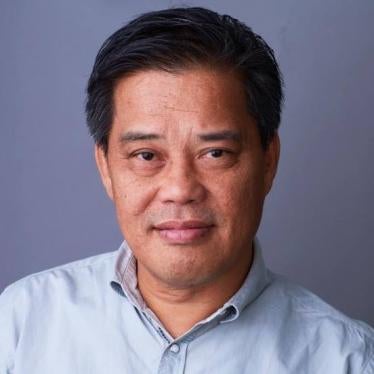In the afternoon of Aug. 18, 2015, five members of the indigenous Manobo tribe were killed in Barangay Mendis, Pangantucan, Bukidnon. How and why they died depends on whose account you believe.
“Junjun,” a relative of those killed, told Human Rights Watch that he and his family were preparing lunch when they heard a shouted order to leave their hut. Junjun’s 70-year-old, nearly blind grandfather, Herminio Samia, a local tribal leader and coffee farmer, came out with his hands raised. Heavily armed Army soldiers had surrounded their home. Junjun said that despite his pleas, the soldiers shot and killed his grandfather on the spot.
Junjun said he survived only by jumping into the nearby bushes and running as fast as he could. As he fled, he heard shots being fired. The next morning, relatives found the bodies of Emer Somina, 17; his brother Welmer Somina, 19; Norman Samia, Herminio’s grandson, 14; Jobert Samia, Herminio’s son, 20; and Herminio himself.
The Army reported the next day that the First Special Forces Battalion had come into contact with a group of communist New People’s Army (NPA) rebels and killed five of them in a “legitimate encounter.” The Army said that a paraffin test found gunpowder on the hands of those killed, and that soldiers discovered “NPA documents” and at least one weapon, an AK-47 assault rifle, where the killings occurred. Family members of those killed, however, denied any NPA affiliation. The NPA subsequently issued a statement confirming a firefight with the military on Aug. 18 just four kilometers from Mendis, but asserted that the five dead in Mendis were civilians.
The Mendis incident is just one of several alleged extrajudicial killings attributed to the Philippine military and military-backed paramilitary forces in 2015. Last Jan. 17, alleged paramilitary men fired on three people who were walking home in a barangay in Davao del Norte, killing Alibando Tingkas, a 15-year-old student at a school for indigenous peoples. According to the Save Our Schools Network, which monitors attacks on schools, the school had been under threat by military and paramilitary forces in recent years.
Last September, paramilitary men shot to death a teacher and two tribal leaders in Lianga, Surigao del Sur. Witnesses said soldiers were nearby, but did not intervene. The Army said that days after the incident, soldiers could not respond to the incident for fear of endangering the dozens of residents that the paramilitary had rounded up and held at gunpoint.
Strong evidence is said to link Army personnel to the May 24, 2015, killing in Negros Oriental of Endric and Rosalie Calago. Endric was a member of the leftwing peasant group Kilusang Magbubukid ng Pilipinas; Rosalie was a barangay health worker.
The military’s knee-jerk response to all of these incidents—that they were “legitimate encounters” with rebels—reflects a deeply rooted culture of impunity for military abuses in the Philippines. Data from the Department of National Defense indicate that only one soldier has been convicted of an extrajudicial killing since 2001. The arrest in August 2014 of Jovito Palparan, a retired Army major general, marks a rare challenge to the impunity enjoyed by members of the security forces who commit serious crimes, and which the Aquino administration has failed to adequately address. Palparan had epitomized that impunity by evading arrest for three years, allegedly with the help of former military colleagues. He has been charged with kidnapping and illegal detention.
The Armed Forces of the Philippines has a legal obligation to do better. That obligation will require the AFP chief of staff, Gen. Hernando Iriberri, to recognize the severity of the problem and to take concrete steps to address it. Iriberri can start by ordering the AFP Inspector General and the Provost Marshal to promptly and impartially investigate all credible allegations of human rights abuses by military personnel.
Iriberri should stop turning a blind eye to the activities of numerous paramilitary groups under the military’s command and control. These groups have been implicated in harassment, killings and other abuses for many years. Until such abusive units are disarmed and disbanded, the military will be complicit in their violations of human rights.
The clock is ticking for President Aquino, who will leave office in June, to take action to help ensure that his legacy of six years would not be tainted by these abuses. He should order the military to conduct credible, impartial and transparent inquiries into these incidents and ensure that the military personnel responsible for extrajudicial killings and other serious crimes are fully and fairly prosecuted, regardless of their rank. He should also direct the Department of Justice, the Commission on Human Rights and other relevant agencies to investigate these cases and not leave matters to the military alone.
In the misty hinterland of Mendis, the cool, rolling hills yield an abundance of carrots and other top-selling vegetables that farmers like Paulino Somina hawk in the lowlands. But these days, he just stays in his hut with his wife because they find the chilly afternoons gloomy.
“My boys would be out playing basketball at this time of day,” he told me, glancing in the direction of the community basketball court where a squad of soldiers from the same unit that killed his family members had turned a “multipurpose hall” into an armed encampment. “My sons didn’t do anything to them to justify a death like that.”
Carlos H. Conde is the Philippines’ researcher at Human Rights Watch.









